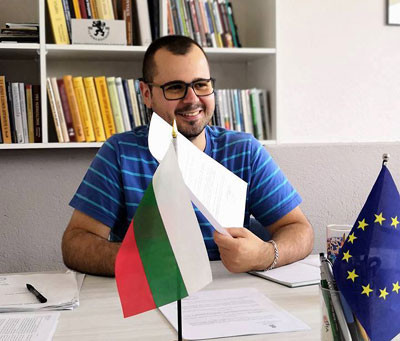Problems of the Bulgarian minority in the Western Outlands, separated from the Bulgarian state after the First World War under the Neuilly Peace Treaty, have been piling up for years, and attempts by the Serbian government to solve some of them have only recently started. Perhaps one of the reasons for this is the desire of our western neighbor to join the EU in 2025. The timeline, though indicative, was included in the Strategy for the Western Balkans adopted during the Bulgarian Presidency of the Council of EU.
A sign of policy change is also the three-fold rise in funding for Bulgarian media in Serbia, agreed during a meeting between Bulgarian President Rumen Radev and his Serbian counterpart Alexander Vucic in June 2018. However, not all problems of the community have been solved.
The Bulgarian community in the Western Outlands is extremely active in keeping Bulgarian traditions and contacts with Bulgaria alive. The Bulgarian-Serbian Center in the city of Vranje, which was officially opened today, will also be working in this direction. The event was another reason to put the situation of the Bulgarian minority in the city of Vranjе on the discussion table.
This was also central to the meeting of the Bulgarian Ambassador to Serbia, Radko Vlaikov, the Consul-General in Nis, Edvin Sugarev, the Chairman of the State Agency for Bulgarians Abroad, Petar Haralampiev and the chairman of the Bulgarian-Serbian Center Darko Anachkov with the local authorities in Vranje.
 "The creation of the Bulgarian-Serbian Center at the end of 2017 was a great challenge because it is very difficult to find people who want to work, not so much for the money but for a cause," head of the center Darko Anachkov said and added :
"The creation of the Bulgarian-Serbian Center at the end of 2017 was a great challenge because it is very difficult to find people who want to work, not so much for the money but for a cause," head of the center Darko Anachkov said and added :
“Our goals include providing comprehensive information in Bulgarian, defending the rights of Bulgarian and their interests and giving them some sense of security so that they can freely declare their national identity. In cooperation with the Bulgarian and Serbian state institutions, we want to work for teaching Bulgarian language in schools, which is crucial for the preservation of national self-awareness. Also, in cooperation with Bulgarian cultural institutions, we want to offer to the Bulgarians in Vranje different cultural events - concerts, theater plays, excursions to Bulgaria, as they are something almost impossible for them. We also want to apply for projects aimed at Bulgarians abroad and projects in the framework of cross-border cooperation.”
With the help of the program for cross-border cooperation between Bulgaria and Serbia and in partnership with the Kyustendil municipality, the team of the Bulgarian-Serbian Center has organised the project "So Close - So Far Away", which includes filming a documentary promoting the cultural heritage of Vranje and Kyustendil as close towns on both sides of the border. The name of the film is Guardians of Cultural Heritage and its shooting is expected to end in November this year.
English: Alexander Markov
Photos: Yoan KolevYoan KolevWith more 40 thousand archaeological sites and artifacts, Bulgaria is a true open-air museum. In terms of the number of finds, this country ranks third in the world after Italy and Greece. From the Neolithic, eight millennia ago, to..
NATO tests new 'no U.S.' mission model in Balkans NATO is testing its ability to deploy rapidly across Eastern Europe - without direct US support - as Washington shifts its approach to European defence and the war in Ukraine, the Associated Press..
Love blooms with renewed vigour every year on 14 February! Valentine's Day is increasingly being celebrated in Bulgaria as a holiday that inspires lovers to share beautiful moments together. Traditions include the exchange of cards, gifts and romantic..
Exactly a month after the Bulgarian National Radio solemnly celebrated its 90th anniversary, history continues its dialogue with us, its authors. With a..

+359 2 9336 661
